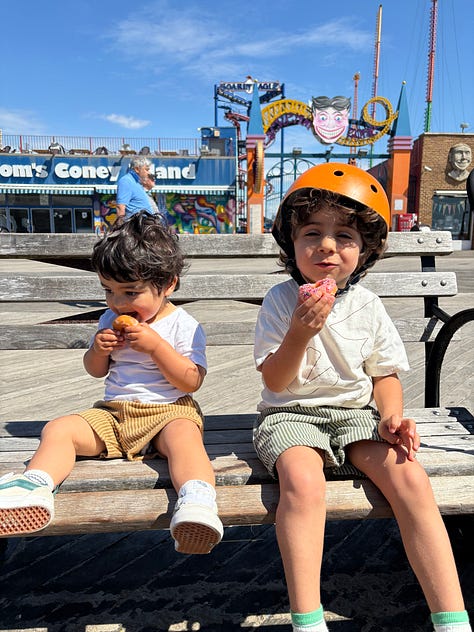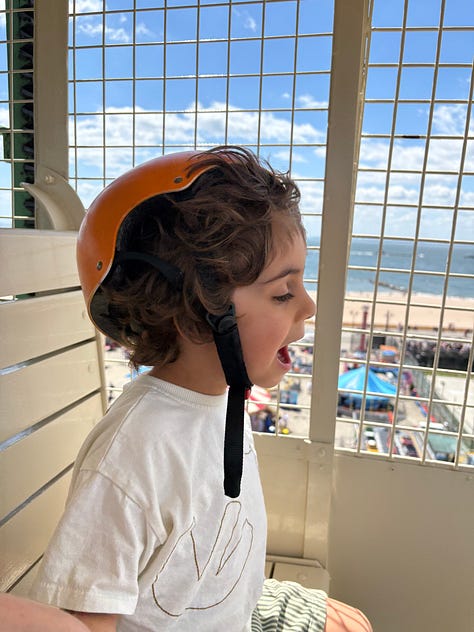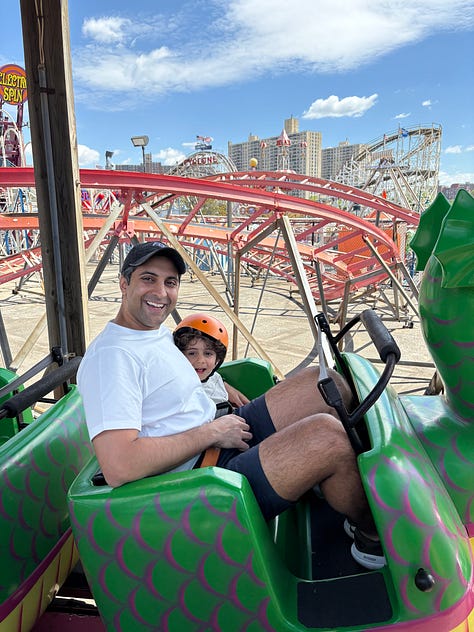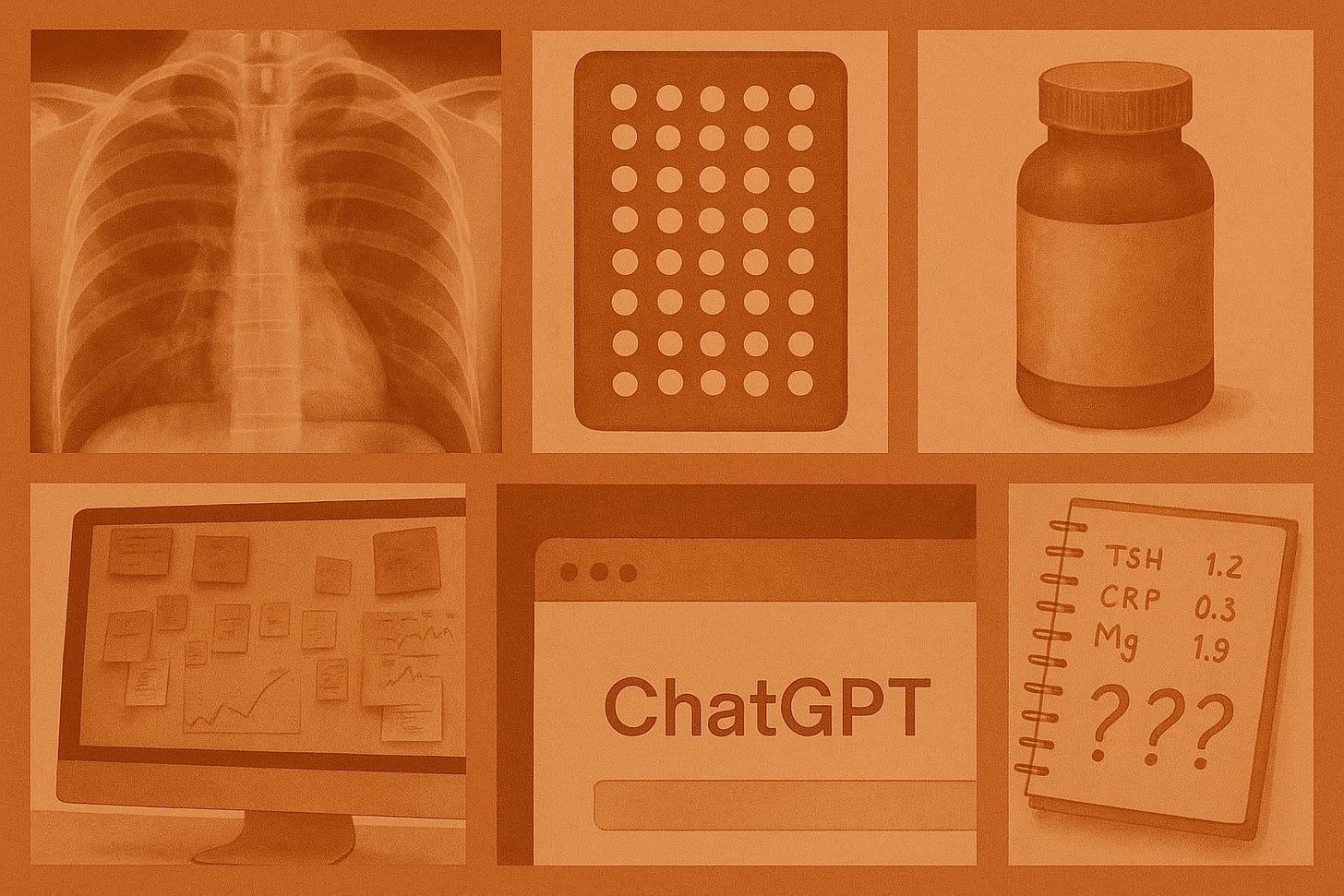Dr ChatGPT is better than Dr Google
But is it better than your actual doctor? Some do's and don'ts.
People are uploading their medical records to ChatGPT. Your reaction to this is likely either “Yeah, duh, I'm finally getting the explanations I need” or “That's irresponsible at best, and dangerous at worst.”
Over the past year, I’ve found myself using ChatGPT almost daily for work and parenting questions, but also as a kind of health co-pilot. Not to replace a doctor’s advice (obviously, though becoming less obvious?), but to amplify my own ability to tee up the way I want my doctors to support me.
Some common concerns about using ChatGPT for our health include privacy breaches, incorrect or outdated medical advice, lack of context, oversimplification of complex situations, bias, or overconfidence.
Here’s the thing: real life doctors are not immune to those things either. The critical role of doctors isn’t going away, but ChatGPT makes an extremely powerful complement, if you use (both of) them right.
How I use AI for my health
To synthesize health info and research
I've done a full-body MRI with Prenuvo, blood panels with Function Health, GI tests, pee tests, and follow-up thyroid ultrasounds from the radiofrequency ablation I did in Germany for my 6cm thyroid tumor. That’s a lot of data points. ChatGPT helps me make sense of them and synthesizes what the relevant research says in plain English. It helps me connect the dots across functional and conventional frameworks.
Bonus: it remembers my health history, so I don’t have to keep explaining that I already take a probiotic or I’m already sleeping as much as I can (with young children, hello) or that some testing shows I don't “methylate” well. It never tells me to “manage my stress” (not helpful!).
To audit my current routine
Should I rotate my probiotics? Is red light therapy legit? Does my supplement stack make sense for me? How could I simplify it? Am I doing enough cardio for my heart health? Instead of falling down Google rabbit holes, I ask ChatGPT to summarize the evidence and tell me what's proven, disproven or — most interestingly — what's promising but unproven.
To get really personalized options
In a world where 18-minute doctor appointments barely scratch the surface (if you can even get an appointment), I’ve needed someone (?) to hear my constellation of symptoms and goals, and prioritize tangible areas to consider taking action. I've used ChatGPT to flesh out pros and cons, help me think about risks, and propose questions for my doctors.
It never patronizes me when I ask if thyroid nodules could be related to my problematic childhood tonsils or when I tell it that something feels “off.”
The art of triangulation
As I've discussed in my post The Art of Triangulation, I don’t believe in making consequential medical decisions based on the opinion of a single doctor. Doctors are people, and they are fallible just like we all are. I believe the best thing we can do for ourselves as patients is facilitate the right conversations with our doctors, and the best way to do that is by asking the right questions.
But how do you know what questions to ask? I see ChatGPT as being excellent at coaching you on what might warrant further discussion or as a second opinion for a discussion you already had. Here are some do’s and don’ts I’ve been playing around with, but would be curious for your thoughts too:
Do:
Use it to summarize research, treatment options, or clinical guidelines
Prompt it to ask clarifying questions or flag missing information
Ask candid or “embarrassing” questions you may avoid with your doctor
Use it as a second opinion or prep tool before appointments
Ask for pros and cons to help weigh medical decisions
Don't:
Treat it as your primary care provider or rely on it for diagnoses
Upload identifiable health info unless it’s redacted (name, DOB, etc) or you're okay with it no longer being HIPAA-protected
Assume its advice is definitively correct or up-to-date
Delay urgent care or ignore symptoms
Expect useful output without providing detailed context
Think of Dr. ChatGPT as a significantly better version of Dr. Google. When you are up at 11pm Googling symptoms, and you’d otherwise be sifting the internet by yourself trying to make sense between sanity and lunacy, you’d be dramatically better off getting a summary from ChatGPT, and asking it about the credibility of its sources. You can then take the advice to your doctors to poke holes at your plan, or write orders for more testing, or help find a referral for a specialist.
ChatGPT is not uniquely dangerous but it’s true we’re still learning how to use it safely. Human doctors have malpractice systems, licensing boards, and years of social trust. LLMs don’t (yet). It’s not about whether ChatGPT is “better” than doctors. But they do create a fantastic second opinion, a complement, that will only become stronger as dedicated healthcare AI solutions build in privacy, clinical validation, and ethical safeguards.
Because the first rule of trusting AI is to not completely trust AI. But in a system that gives you just a few minutes with a provider, and a portal message that takes 5 days to answer, you either become your own advocate or you fall through the cracks. I choose to advocate, with the help of a robot ;)
Highlights of the week
Our first actual kid party: Miles turned 4 this weekend. In truth, all previous birthday parties were, in fact, parties for us that we threw in his name. Our friends, our food, our venues. This time we completely capitulated to the true “kid” birthday party, renting out his no-frills Taekwondo studio, outsourcing the activities, set up, and (most importantly) mess. We only invited people with kids around the same age, whether or not we were friends with the parents. Verdict: 10/10 would recommend, with the following tips: (a) we picked a place with an actually engaging structure (b) they played great music that both adults and kids like (c) we brought nice food and drinks for the adults. Definitely still a party for kids, but not misery for the adults! We also did not give out gift bags full of junk and instead opted for one “nice” party favor, a single stuffed tiger snap bracelet per kid, a little weird, but a hit! Hoping to inspire you so you don’t give my kid bags of junk I have to secretly toss, thanks in advance.
Electric Flosser: I’ve always hated flossing. In the early days of Facebook, I remember joining a group called “I lie to my dentist about flossing” (I was hilarious). I don’t like getting spit all over my fingers, I feel wasteful throwing out those plastic picks after a single use, and even with daily flossing, I always had inflamed and bleeding gums, which got even worse during pregnancy. The thought of taking up valuable counter space with a water flosser contraption isn’t something I even considered. But I’m happy to tell you that I am now a person with healthy gums who loves to floss after buying an electric flosser. It vibrates giving my gums a great massage, you can reuse the floss heads, and your hands don’t get covered in spit. I use Slate but have also heard good things about Flaus.
Brazilian Lymphatic vs Manual Lymphatic Drainage: As part of my thyroid procedure recovery, I’ve been focused on finding ways to stimulate my lymph system, known for boosting circulation and healing. Until last week I had only ever tried the gentle manual lymphatic drainage massages where they use light rhythmic strokes. I was excited to try the Brazilian one because I felt compelled to do more abdominal massages but I’m now confused about the hype? I was basically beaten up with wooden tools for an hour and when I looked up after the fact how these opposite techniques are both for lymphatic drainage, it seems like the Brazilian technique is more for temporary contouring which might be appealing before a beach weekend but ultimately juice wasn’t worth the squeeze (ha) for me. I noticed no material results. Sticking to the regular gentle kind!



I’m still surprising myself by how often I turn to ChatGPT for my health, not just for summarizing lab results or vetting supplements, but for things like translating a German radiology report, connecting the dots between standard of care and “woo,” or reframing a vague symptom in clearer language so I’ll be taken seriously. It’s become part health coach, part research assistant, part gut-check. I’d be curious to hear how you are using it. What’s been helpful, or totally unhelpful? Where do you draw the line? What’s holding you back?
Until next time,
Joanne
P.S. If you found this post helpful, I’d appreciate it if you <3 it!
If you’re new here:
This is “A little woo,” where I’m exploring why the medical system is losing smart patients, how to advocate for ourselves without losing our minds, and what happens when startup thinking collides with healthcare bureaucracy. Plus, you'll get honest takes on parenting, startups, wellness, and finding your way when the usual playbook isn't working, from a multiple-time startup exec mom who loves science…with a side of woo. Check out my first post Becoming woo for the backstory on why I started this substack or you can read about my personal woo philosophy.






In February my first trimester bloodwork returned an elevated ferritin level so they repeated the test. I was on my way to the airport for a family vacation on Saturday morning and got the notification from Epic that I had new test results (after a decade in working in EHR tech I fundamentally believe patients should not have access to their medical records that is not contextualized) and it was still elevated. My first stop was to Google it which concluded I had leukemia. After 30 seconds of panic I went to Claude and "presented myself" to it: "You are an OBGYN, 35 year old patient presents at 14 weeks pregnant with the following lab results..." and included all the info from my bloodwork. Claude said I was probably fine, follow up with a hematologist to confirm I don't have hemochromatosis. I basically forgot about it transitioning into parenting a toddler on "vacation" and then got a call from my midwife on Monday that it was still elevated, stop taking my prenatal which has iron in it and will refer me to a hematologist but I'm probably fine. Turns out I am indeed totally fine (actually better to start pregnancy with elevated ferritin to reduce risk of anemia in the third trimester), back on my prenatal, and will not be googling medical questions anymore.
I'm doing the same as you! It's no substitute for a physician, but it is a fantastic way to think through ideas and save time while researching. For me, it's particularly helpful because I process information by interacting with it. So it's great to be able to read and then follow up with questions.